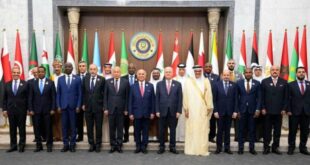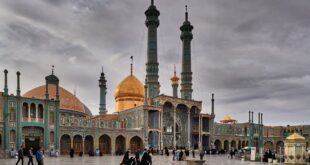 BEIRUT (AFP) — The UN vote to set up an international court for the murder of Lebanese ex-premier Rafiq Hariri was hailed by his supporters on Thursday but it stirred up fears of more instability in the deeply-divided country.The legally binding resolution, which was narrowly approved by the UN Security Council late on Wednesday despite five absentions, sets a June 10 deadline for an agreement on the tribunal to come into force.
BEIRUT (AFP) — The UN vote to set up an international court for the murder of Lebanese ex-premier Rafiq Hariri was hailed by his supporters on Thursday but it stirred up fears of more instability in the deeply-divided country.The legally binding resolution, which was narrowly approved by the UN Security Council late on Wednesday despite five absentions, sets a June 10 deadline for an agreement on the tribunal to come into force.
On the streets of Beirut, Hariri supporters set off fireworks and celebratory gunfire, voicing hope the court will finally uncover the truth of the 2005 murder of the popular billionaire prime minister which sent shockwaves through the nation.
“It is a historic moment… the court is not about vendettas, but about justice for all,” said Hariri’s MP son Saad, leader of the anti-Syrian parliamentary majority. He described the vote as “an opportunity for all Lebanese to unite”. But the powerful Shiite movement Hizbollah blasted the UN vote as illegal and “an aggressive interference in [Lebanon’s] internal affairs”. “This is a blatant violation which makes the resolution illegal and illegitimate both nationally and internationally,” it said.
There are fears the decision could further upset the fragile stability of Lebanon, in the grip of a deep political crisis and renewed security fears over a deadly standoff between the army and an Islamist armed group. Syria, Lebanon’s former power broker which has been widely blamed for the killing, and its allies in Beirut said the vote smacked of foreign meddling. Ten of the Security Council’s 15 members voted in favour of Resolution 1757, with veto-wielding members Russia and China as well as South Africa, Indonesia and Qatar — three non-permanent members — abstaining.
Hariri and 22 other people were killed in a massive truck bombing on the Beirut seafront in February 2005, triggering a groundswell of domestic and international protests that forced Syria to end nearly 30 years of military domination.
An initial UN inquiry implicated Damascus and its allies in Lebanon, where four pro-Syrian security chiefs were arrested in late 2005. But Syria has vehemently denied any involvement and vowed not to cooperate with the tribunal.
Lebanese Prime Minister Fuad Siniora said a trial would allow for “the truth, the whole truth and nothing but the truth” to be revealed, saying the court is “not directed against anyone and especially not sister Syria”. The project has been at the heart of a long-running political dispute that has paralysed Siniora’s government since the opposition, led by Hizbollah, pulled out six Cabinet ministers in November.
Western powers had put forward the resolution to impose the court unilaterally after UN chief Ban Ki-moon reported that Lebanon’s political rivals had failed to agree on ratifying the 2006 accord.
The tribunal, which will be held in an as yet undetermined “neutral” location, is not likely to be up and running for several months at least and it is not clear how it will operate or who will actually stand trial.
“Israeli-American resolution par excellence, which cannot be interpreted as the will of the international community, as the strong divisions on the Security Council demonstrated,” Syria’s official Tishrin newspaper said.
The six co-sponsors — the United States, Britain, France, Belgium, Slovakia and Italy — hailed the text while other nations expressed concern about interfering in an already unstable situation.
“In line with the wishes of the Lebanese people, of all sides and all religious beliefs, there will be no impunity” for Hariri’s killers, said Foreign Minister Bernard Kouchner of Lebanon’s former colonial power France.
“This shows the will of the international community to reinforce the stability of Lebanon,” he added, saying the Security Council had “fulfilled its responsibilities faced with the institutional dead end in Lebanon.” US Ambassador to the UN Zalmay Khalilzad said he hoped the court will “deter future political assassinations” in Lebanon, where four prominent critics of Damascus have been killing in a spate of attacks since Hariri’s murder.
However, Syria’s UN envoy Bashar Jaafari opposed the move, saying: “Definitely this is something that goes against the interests of the Lebanese people and Lebanon as a whole.” And Russian ambassador Vitaly Churkin objected to the reference to Chapter 7 of the UN Charter, used in cases of threats to international peace and security.
He also called the resolution “dubious from the standpoint of international law” as it bypasses the requirements of Lebanon’s constitutional process.
And in Berlin for talks with the quartet of main Middle East players, Russian Foreign Minister Sergei Lavrov warned that a sharp increase in US military aid earmarked for Lebanon could destabilise the country.
 Eurasia Press & News
Eurasia Press & News



